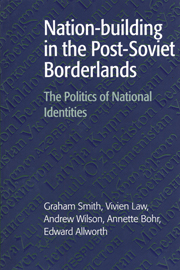Book contents
- Frontmatter
- Contents
- List of figures
- List of tables
- Preface
- The post-Soviet borderland states
- 1 Post-colonialism and borderland identities
- Part I Rediscovering national histories
- Part II Ethnopolitics and the construction of group boundaries
- 5 Nation re-building and political discourses of identity politics in the Baltic states
- 6 Redefining ethnic and linguistic boundaries in Ukraine: indigenes, settlers and Russophone Ukrainians
- 7 The Central Asian states as nationalising regimes
- Part III Language and nation-building
- Notes
- Index
7 - The Central Asian states as nationalising regimes
Published online by Cambridge University Press: 01 June 2011
- Frontmatter
- Contents
- List of figures
- List of tables
- Preface
- The post-Soviet borderland states
- 1 Post-colonialism and borderland identities
- Part I Rediscovering national histories
- Part II Ethnopolitics and the construction of group boundaries
- 5 Nation re-building and political discourses of identity politics in the Baltic states
- 6 Redefining ethnic and linguistic boundaries in Ukraine: indigenes, settlers and Russophone Ukrainians
- 7 The Central Asian states as nationalising regimes
- Part III Language and nation-building
- Notes
- Index
Summary
In firmly linking nationality to the notion of ethnic homeland, the practitioners of Soviet ideology generated a belief system which held that each titular nation is indivisibly connected through its putative history to a particular territory that is the natural patrimony of that nation. As in the other post-Soviet successor states, the collapse of the USSR has allowed political entrepreneurs in Central Asia to link the cultures of the titular nations even more closely to state structures and to further secure their political pre-eminence within the new citizen-polities.
This chapter explores the nationalising state, which Rogers Brubaker has defined as the polities of and for particular core nations, as a plausible and useful model to describe the new states of Kazakstan, Kyrgyzstan, Uzbekistan and Turkmenistan. The study is in two parts. The first part discusses the social, demographic and political forces both inducing and constraining nationalisation processes in those states, and the second part examines and compares specific nation-building practices as well as the implications that follow for the large Russian diasporas in the region.
The titular nation as primus inter pares
In addition to drawing on Soviet bureaucratic structures and institutions, the Central Asian states have underpinned their independence by elaborating nationalising policies and practices that seek to assert the hegemony of their respective titular nations. Despite formulations in the constitutions and other legislative acts guaranteeing the equality of all citizens, nationalising policies and practices are manifest in, inter alia, the iconography of the new regimes, the privileged status accorded to the local languages, newly revised histories and the exclusion of members of non-eponymous groups from the echelons of power.
- Type
- Chapter
- Information
- Nation-building in the Post-Soviet BorderlandsThe Politics of National Identities, pp. 139 - 164Publisher: Cambridge University PressPrint publication year: 1998
- 5
- Cited by



